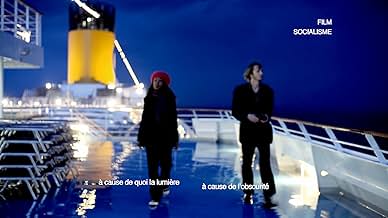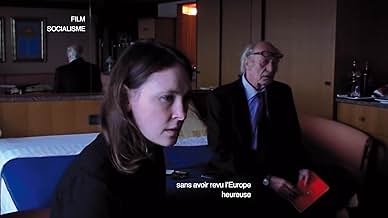Film socialisme
- 2010
- Tous publics
- 1h 42min
NOTE IMDb
5,7/10
3 k
MA NOTE
Les passagers d'une croisière en Méditerranée profitent de leur luxe tandis qu'une petite famille se bat contre l'attention excessive des médias.Les passagers d'une croisière en Méditerranée profitent de leur luxe tandis qu'une petite famille se bat contre l'attention excessive des médias.Les passagers d'une croisière en Méditerranée profitent de leur luxe tandis qu'une petite famille se bat contre l'attention excessive des médias.
- Récompenses
- 5 victoires et 2 nominations au total
Agatha Couture
- Alissa (segment "Des choses comme ça")
- (as A. Couture)
Mathias Domahidy
- Mathias (segment "Des choses comme ça")
- (as M. Domahidy)
Quentin Grosset
- Ludovic (segment "Des choses comme ça")
- (as Q. Grosset)
Maurice Sarfati
- (segment "Des choses comme ça")
- (as M. Sarfati)
Nadège Beausson-Diagne
- Constance (segment "Des choses comme ça")
- (as N. Beausson)
Dominique Devals
- (segment "Des choses comme ça")
- (as D. Devals)
Marine Battaggia
- Florine "Flo" Martin (segment "Quo vadis Europa")
- (as M. Battaggia)
Histoire
Le saviez-vous
- AnecdotesThe film did not include traditional English language subtitles for releases in countries that spoke such language. Instead, the subtitles were in "Navajo English", a translation that baffled many critics and audience members.
- GaffesSomeone claims that Napoleon founded the Comédie-Française in 1812 in Moscow. Actually, it was founded in 1680 by Louis XIV.
- Citations
Rebecca (segment "Des choses comme ça"): [dialogue continuity] You're absolutely right: I don't love any "people." Not French, not North American, not German. Not Jewish people, not black people. I love only my friends... When there are any.
- ConnexionsEdited from Le cuirassé Potemkine (1925)
Commentaire à la une
Jean-Luc Godard is a reference in cinema and changed the art fifty years ago with a unique challenging style that defied current esthetics and etiquette.
His latest work can be described more as an eclectic experiment than any enduring piece of cinema, but it serves to show his mastery of the art and his ability to dissect it in its most basic components before trying to create a different, distinct experience for the viewer. He plays with themes, locations, styles and intermingles with little restriction photos, videos, ambient sounds, silence, music, narrations, monologues, dialogues to delves into a dream-like undefined cinematic discussion.
The film does not quite work as a whole, precisely from this lack of focus, but some of the imagery (some sharp and some out of focus, some old and some new, some seemingly meaningless and some full of allegories, etc.), dialogues (existential, simple, social, revolutionary) and intertitles do reach a cord and will be remembered subconsciously or consciously. It's lack of clear content or continuity should not take away from it's task of deconstruction and desire to destabilise our current comforts. In that aspect, Godard grabs the rug under conventional cinema and pulls very hard to make it topple over dumbfounded and confused.
There are three segments, each shorter than the previous, but besides being glad to finally leave this seemingly derelict boat and to briefly know a fictional philosophising family, there is not enough distinction between the segments to warrant further feedback at this point. Only that as Godard's life perhaps, and exemplified in the crafty ancient time-telling device in segment #2, time is getting shorter...
Maybe we'll get it right some day, may be one of many messages of this remue-méninges.
His latest work can be described more as an eclectic experiment than any enduring piece of cinema, but it serves to show his mastery of the art and his ability to dissect it in its most basic components before trying to create a different, distinct experience for the viewer. He plays with themes, locations, styles and intermingles with little restriction photos, videos, ambient sounds, silence, music, narrations, monologues, dialogues to delves into a dream-like undefined cinematic discussion.
The film does not quite work as a whole, precisely from this lack of focus, but some of the imagery (some sharp and some out of focus, some old and some new, some seemingly meaningless and some full of allegories, etc.), dialogues (existential, simple, social, revolutionary) and intertitles do reach a cord and will be remembered subconsciously or consciously. It's lack of clear content or continuity should not take away from it's task of deconstruction and desire to destabilise our current comforts. In that aspect, Godard grabs the rug under conventional cinema and pulls very hard to make it topple over dumbfounded and confused.
There are three segments, each shorter than the previous, but besides being glad to finally leave this seemingly derelict boat and to briefly know a fictional philosophising family, there is not enough distinction between the segments to warrant further feedback at this point. Only that as Godard's life perhaps, and exemplified in the crafty ancient time-telling device in segment #2, time is getting shorter...
Maybe we'll get it right some day, may be one of many messages of this remue-méninges.
- christian94
- 19 août 2012
- Permalien
Meilleurs choix
Connectez-vous pour évaluer et suivre la liste de favoris afin de recevoir des recommandations personnalisées
- How long is Film socialisme?Alimenté par Alexa
Détails
- Date de sortie
- Pays d’origine
- Site officiel
- Langues
- Aussi connu sous le nom de
- Film Socialism
- Lieux de tournage
- Sociétés de production
- Voir plus de crédits d'entreprise sur IMDbPro
Box-office
- Montant brut aux États-Unis et au Canada
- 42 925 $US
- Week-end de sortie aux États-Unis et au Canada
- 4 526 $US
- 5 juin 2011
- Montant brut mondial
- 222 079 $US
Contribuer à cette page
Suggérer une modification ou ajouter du contenu manquant

Lacune principale
By what name was Film socialisme (2010) officially released in India in English?
Répondre























